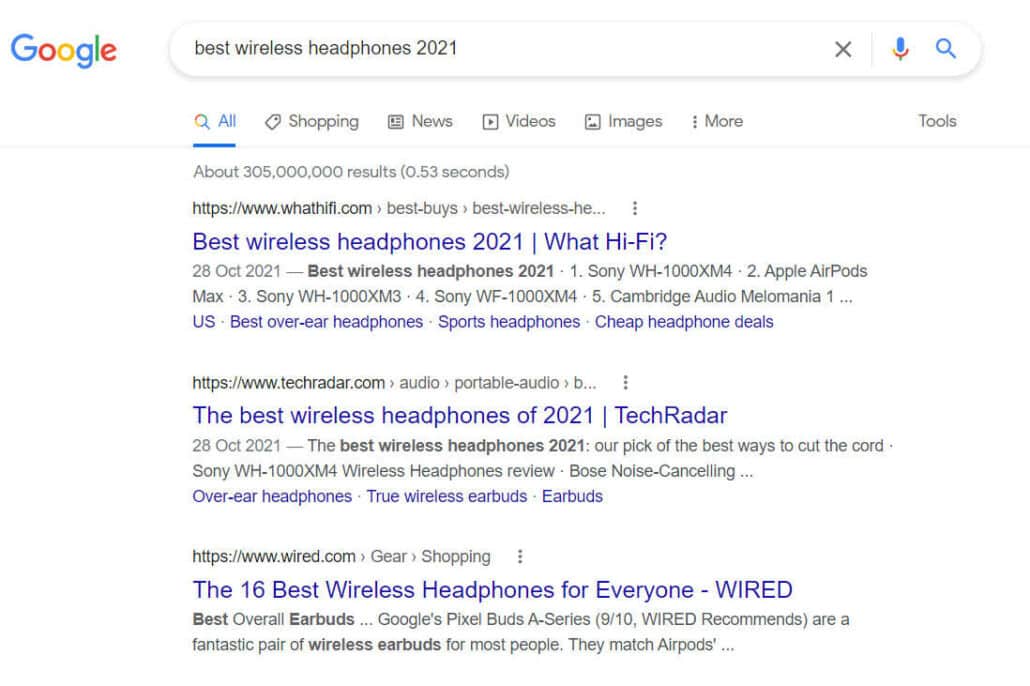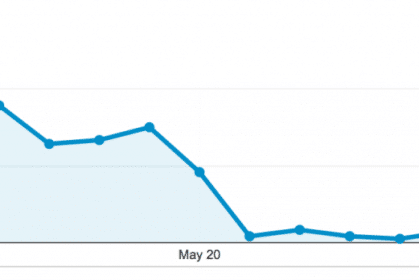

05/11/2021, SEO
Can you really trust online reviews?
You want to buy a Christmas gift for your loved one. So you pop over to Google and search, “best wireless headphones 2022”.
You see a list of articles from several well-known publishers highlighting the virtues of various headphone brands.

How do you know if these reviews can be trusted?
The short answer is that, in most cases, you probably can’t trust these reviews.
If you look very closely at these articles, you are likely to see (usually in tiny print) a statement declaring, “We may receive a commission if you buy through links on our site”.
This message is usually tough to spot. It’s unlikely that you have ever noticed it while reading product review articles online.
“Why does this matter? So what if the publisher earns a commission from these products? It must cost a lot of money to pay experts to write these reviews. Why shouldn’t they earn some commission?”
The fact that the publisher earns a commission from the products they are reviewing often has an enormous impact on both the selection of the products and the quality of the review.
Since the demise of print publishing, affiliate commission is now the primary business model upon which most of these publishers depend. Without this commission, many of these sites would simply cease to exist.
For this reason, most publishers won’t even consider including a product in the article if it’s not part of the affiliate scheme in which they participate. When you are looking for the best headphones, best laptops or best air fryers, your goal is to discover the best product available, not just those that happen to be offered by the publisher’s affiliate partner.
Outsourced Content
In many cases, the publishers will have outsourced these product reviews to an external marketing agency. That agency then, in turn, outsources the writing of these product reviews to inexperienced freelance writers at minimal cost.
These writers are not product experts. In most cases, they will have neither seen nor tested the product being reviewed. They are not paid enough to spend the time it would take to evaluate the product or test its quality and features properly. Instead, they simply look up the product specification on Amazon and compare the list of features with similar brands from which the publisher earns a commission.
Content-writing Robots
In some cases, these product reviews are not even written by human writers. For example, here is an excerpt from a product review I created using Artificial Intelligence software:
“What started as a terrific offering from Dell has evolved into the laptop that all other Windows laptops look up to, combining sheer power with an elegantly stunning design, an exquisite display, and a feature set that’s unparalleled. Though the fact that it also features one of the best keyboards on any laptop is just icing on the cake. “
To be clear, this paragraph wasn’t plagiarised from an existing review. It is unique, original content produced by a low-cost automated tool.
More publishers are likely to start using these tools to write product reviews and avoid the cost of human writers entirely.
So, where can I find trustworthy reviews?
I’m afraid it is doubtful that you will find any source of trustworthy reviews by searching on Google.
A tiny number of reputable publishers operate a paywall model for which you will have to pay a monthly subscription to access their content. Because this content is only made available to paying subscribers it is invisible to Google.
There are also a small number of specialist publications employing writers with specific product expertise who do actually test and evaluate the products they are reviewing. However, unless you are already familiar with these titles, there is no simple way to differentiate these publications from those that are less trustworthy.
What could be done to solve this problem?
On the 8th April 2021, Google announced a change to their ranking algorithm, known internally as the Product Reviews Update.
This update is intended to promote reviews which demonstrate the author has “expert knowledge, provides detailed product information, accurately compares the product to other similar products and describes how the product has evolved from earlier models.” All information that cannot be gleaned by simply reading the product description on Amazon or using automated content-writing software.
Since April 2021, the Product Reviews Update appeared to have little impact on low-quality product reviews appearing in Google’s search results. Then, on 1/12/2021, Google announced a further update that does seem to address this issue more closely:
Update from Google on 1/12/2021:
“Over time we have received more feedback from users on what type of review content is deemed trustworthy and useful, motivating us to provide additional product review guidance. Users have told us that they trust reviews with evidence of products actually being tested, and prefer to have more options to purchase the product.
Therefore we are introducing two new best practices for product reviews, to take effect in a future update.
- Provide evidence such as visuals, audio, or other links of your own experience with the product, to support your expertise and reinforce the authenticity of your review.
- Include links to multiple sellers to give the reader the option to purchase from their merchant of choice.”
It remains to be seen whether Google’s algorithms are capable of discerning which review meet this criteria and the degree to which this update will impact the visibility of low-quality reviews. However, this is a step in the right direction and it’s great to see Google attempting to address this issue.
What more could be done?
Most publishers have become wholly dependent on these affiliate commissions. While they may not take any pride in misleading their readers, they can simply see no other way to operate in a financially sustainable way.
I have spoken with several journalists who work for these publications and are appalled by how this content is being produced. One of them told me, “If I ever spoke publicly about the product reviews on our website, I would never work in publishing again”.
In my view, any article that includes affiliate links from which the publisher earns a commission should be treated no differently from an advertisement.
There should be a clear message displayed on every review, stating:
- This review should be treated as an advertisement from which the publisher earns a commission for any products purchased.
- State whether the products were selected from the “whole of the market”.
- State whether the writer has seen and tested the product being reviewed.
- State whether the writer or publisher has been in any way influenced in the product selection or evaluation by an affiliate relationship.
This message should be displayed clearly and prominently at the beginning and end of every review (not the page header or footer). The font size of this message should be at least equivalent to the body text of the review itself and in the same colour.
Displaying this message won’t make these reviews any more trustworthy, but it may help consumers understand the nature of the reviews they are reading.
Any publisher that fails to comply with these requirements should be subject to a fine of up to 10% of the company’s global turnover. These fines could then be used to fund a regulatory body with the resources needed to police these regulations.
While I sympathise with those publishers that see affiliate commissions as the only viable way to keep their titles afloat, this must not come at the expense of maintaining a clear separation between editorial content and paid advertising.
Fake News
We need to be able to trust the information we read online. The mainstream media are only too happy to discuss the problem of “fake news” when it applies to Facebook and Google. Very few are willing to speak about the misleading information published on their own websites. We are, therefore, entirely dependent on public broadcasters such as the BBC and regulators to take action on this issue.
As we speak, these issues are being raised in Parliament and discussed within the context of the Online Safety Bill and the EU’s “New Deal for Consumers”. We can only hope that these discussions result in some meaningful action.
Listen to my interview by Adrian Chiles of BBC Radio 5 Live on this topic:

